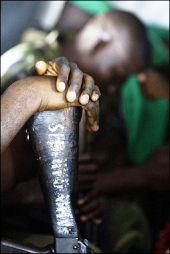NATO to discuss help to Sudan: US official
VILNIUS, April 21 (AFP) — NATO foreign ministers meeting here will discuss help for peacekeepers in troubled Sudan while mulling ways to streamline their forces in Kosovo, a senior US official said.

|
|
Nigerian soldiers belonging to the Africa Union contingent in Sudan. (AFP). |
He said the 26-member alliance, conceived as a bulwark against a Soviet invasion, was also looking to fashion a more political role for itself as a premier forum for discussing crucial trans-Atlantic issues.
The official, who asked not to be named, spoke as the ministers of the 26-member North Atlantic Treaty Organization gathered in the Lithuanian capital Vilnius for their regular spring consultations.
The official said one agenda item would be the African state of Sudan, which is emerging from two decades of civil war in the south but is still plagued by violence in the western region of Darfur.
The ministers will discuss the possibility of providing a 3,000-strong African Union peacekeeping force with assistance in planning, logistics, transportation and command and control.
“It’s been our view for some time that we need all the Europeans and the United States to look at ways to strengthen the African Union force,” the official told reporters accompanying US Secretary of State Condoleezza Rice.
The talks here will come amid stepped-up efforts to end the bloodshed in Sudan. The African Union is considering doubling its contingent and the United Nations has approved a 10,000-strong peacekeeping force.
The African Union has been trying to mediate an end to more than two years of conflict between Khartoum and ethnic minority rebels in Darfur, which has resulted in some 300,000 deaths and 2.4 million people displaced.
UN Secretary General Kofi Annan has approached NATO about help but no formal request has been made. “We think if the African Union made such a request, then NATO’s response ought to be positive,” the US official said.
The NATO ministers will also mull a call by the NATO supreme commander, US General James Jones, for a broad review of the alliance’s 17,000 forces in Kosovo that could lead to a drawdown in the troop strength.
The official said the idea was to organize the troops around flexible task forces and eliminate the practice of “national caveats” that allows countries to bar the use of soldiers for certain missions, such as crowd control.
The discussions come at a critical moment for Kosovo, which has been administered by the United Nations since the end of the conflict in 1999 between Serb forces and ethnic Albanian rebels seeking independence.
If the two measures were implemented, the official said, “the number of forces could be reduced without reducing capability. Nobody believes we should be reducing our capability at this stage.”
The NATO meetings kicked off Wednesday night with a working dinner and discussion of strategic issues, with Rice leading a rundown of efforts to end the Israeli-Palestinian conflict.
Rice told reporters that a major aim of this year’s meeting was to boost NATO’s role as “an important forum for trans-Atlantic dialogue on political issues. It’s the premier forum.”
The US official said the 56-year-old alliance was once a key forum for discussion but the political dimension had faded, especially after the rifts generated by the Iraq war.
“What we learned over the past couple of years … is that we needed to make sure we were using all of our available means to have an intense political dialogue,” he said.
